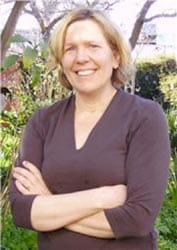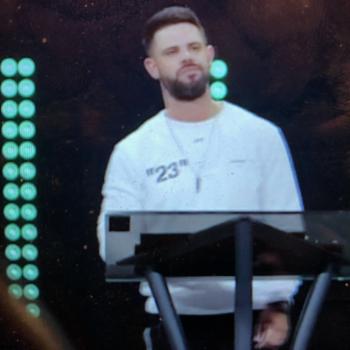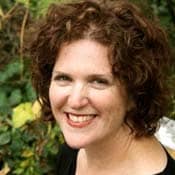Editor's Note: This is the fourth in a new interview series. Each interview asks the same five questions of great preachers in the pulpit today.
 Sara Miles was an unlikely candidate for a preacher. A journalist, former restaurant cook, and atheist, she wandered into St. Gregory of Nyssa Episcopal Church in San Francisco one morning, took Communion, and found a place in the Christian faith even as she found a new passion: to feed the hungry. The food pantry she began in the sanctuary of St. Gregory's now provides groceries to over 1200 families a week. Sara's books, Jesus Freak: Feeding, Healing, Raising the Dead and Take This Bread: A Radical Conversion have made a profound impact and have introduced a new kind of literalism. She believes we really should feed people and we really can be a part of healing others.
Sara Miles was an unlikely candidate for a preacher. A journalist, former restaurant cook, and atheist, she wandered into St. Gregory of Nyssa Episcopal Church in San Francisco one morning, took Communion, and found a place in the Christian faith even as she found a new passion: to feed the hungry. The food pantry she began in the sanctuary of St. Gregory's now provides groceries to over 1200 families a week. Sara's books, Jesus Freak: Feeding, Healing, Raising the Dead and Take This Bread: A Radical Conversion have made a profound impact and have introduced a new kind of literalism. She believes we really should feed people and we really can be a part of healing others.
Sara keeps a busy schedule of writing, speaking, and preaching, in addition to her work with The Food Pantry. I am so grateful that she was able to share her preaching process with me. Sara's perspective pulls me, a lifelong Christian, out of the fog of over-familiarity and the fear of sounding naïve into the simple beauty of the Christian faith and the wonder and challenge of following Jesus in this world. In addition, she is a delightful, generous, and very funny woman who exudes hospitality and grace. I consider her a long-distance mentor, and in her footsteps I find sustenance for my faith and for the future of preaching.
What has been your journey into preaching?
I'm a fairly new convert (I was baptized ten years ago) and converts are notorious for getting all excited and grabbing people and shouting, "Hey! Guess what! Come look at this amazing beautiful thing!" My road to preaching comes, as much as anything, from that impulse to testify.
I've always been a writer, so it's also true that writing remains the most reliable way for me to understand the world. And while sermon-writing is only one part of preaching, it's a part that I really appreciate being able to engage in.
What do you see as the biggest struggle for new preachers?
I can't speak for other preachers, but my biggest struggle is with pride. I want to be smart, I want to be liked, I want to be right. But I'm called to proclaim the Word, not to proclaim my own preaching skill.
Of course skill matters; it's ungenerous and lazy when preachers don't try to write and speak as well as possible. I have to remember, though, I'm using any skill I have in the service of something, someone, much bigger. My job is to point others toward that One.
How do you preach for transformation and/or movement toward justice (without being preachy or moralistic)?
I don't see a lot of percentage in delivering sermons that tell people what they should do—whether the preacher is telling people to abstain from premarital sex, or telling them to sign petitions against global warming. I think it's much more useful for preachers to describe, in examples from scripture and life, what they see God doing: forgiving unreasonably, loving incessantly, pouring mercy on the undeserving, making everything new—and to trust that people will be drawn toward that light, and will desire to enter in to that way of being.
What is your process of preparation for a sermon?
I stall as long as possible. I read the text repeatedly. I read commentary. I talk with friends and colleagues. I do midrash on my own life, and on the experiences of others. I read some more. I stall some more. And at some point I take a walk and start to pray.
The actual writing and re-writing of the sermon takes another day or so . . . and then I often have to cut out the parts I'm most attached to and leave some holes for air to flow through.
Because part of the work of preaching, for me, comes right as I do it. It requires a kind of deep, responsive listening to the whole assembly, so that I can hear the sense of the congregation, be aware of what the Spirit is saying to the people, and bend my prepared text to the unprepared reality of our present moment.
And the sermon isn't over when I'm finished preaching. At my church, there are a full three minutes of silence after the sermon, and then the preacher invites people to stand and share a word, a phrase, or an experience that comes to them. People listen to one another, and listen to the silence—because God is speaking in all of it.
What is the future of preaching?
Same as the past and present: Christ, and him crucified.
5/17/2011 4:00:00 AM





